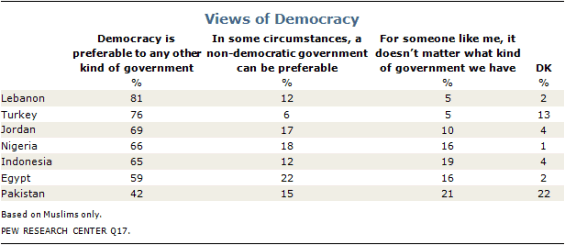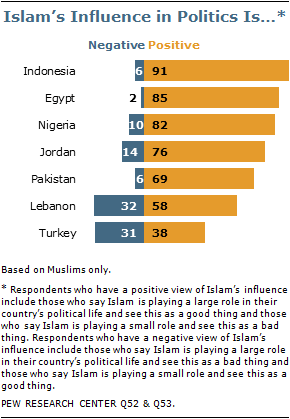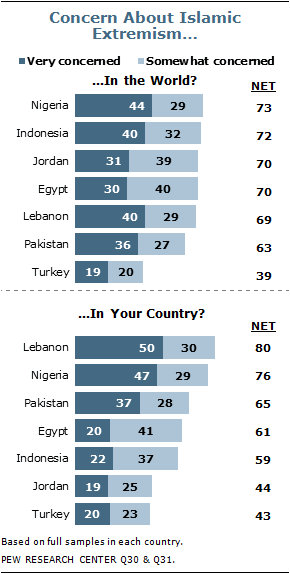With massive protests threatening to upend the three-decades-long reign of President Hosni Mubarak, the world has been captivated by the events in Egypt.
In a survey conducted
April 12 to May 7, 2010, the Pew Research Center's Global Attitudes Project examined the views of Egypt and six other Muslim publics about
politics and the role Islam should play in it.
A 59%-majority of Muslims in Egypt believed that democracy was preferable to any other kind of government. About one-in-five (22%), however, said that in some circumstances, a non-democratic government could be preferable, and another 16% said it did not matter what kind of government is in place for a person in their situation.

Support for democracy was much higher among Muslims in Lebanon, where 81% preferred it to any other kind of government, and in Turkey, where 76% of Muslims  supported it. Roughly two-thirds of Muslims also preferred democracy to any other kind of government in Jordan (69%), Nigeria (66%) and Indonesia (65%). Among the Muslim publics surveyed, only in Pakistan (42%) did fewer Muslims say democracy was preferable to any other kind of government than in Egypt.
supported it. Roughly two-thirds of Muslims also preferred democracy to any other kind of government in Jordan (69%), Nigeria (66%) and Indonesia (65%). Among the Muslim publics surveyed, only in Pakistan (42%) did fewer Muslims say democracy was preferable to any other kind of government than in Egypt.
Egyptians were split on how big a role Islam played in the political life of their country. Among Muslims in Egypt, 48% said Islam played a large role in their nation's political life while a nearly equal 49% said it played only a small role.
Divisions about the perception of Islam's role in politics were also seen in Lebanon and Pakistan.
In contrast, Muslims in Indonesia, Nigeria and Turkey overwhelmingly agreed that Islam played a large role in their politics.
By wide margins, Muslims surveyed in the spring of 2010 believed that Islam's influence in politics was positive rather than negative. In Egypt, Islam's role in politics was seen favorably by an overwhelming 85%-to-2% margin among Muslims.

Islam was seen as a positive rather than negative influence in politics by equally impressive margins in Indonesia (91% to 6%), Nigeria (82% to 10%), Jordan (76% to 14%) and Pakistan (69% to 6%).
In Lebanon and Turkey, close to a third said that Islam had a negative influence in politics, but in both nations more believed Islam's influence was positive than said it was negative.
Respondents who had a positive view of Islam's influence included both those who said Islam was playing a large role in their country's political life and saw this as a good thing and those who said Islam was playing a small role and saw this as a bad thing. The reverse was true for those respondents who had a negative view of Islam's influence.
 Asked whether there is a struggle in their nations between those who want to modernize their country and Islamic fundamentalists, a 61%-majority of Muslims in Egypt said they did not see a struggle.
Asked whether there is a struggle in their nations between those who want to modernize their country and Islamic fundamentalists, a 61%-majority of Muslims in Egypt said they did not see a struggle.
Just 31% of Egyptian Muslims saw a struggle between modernizers and fundamentalists in their country. Among the seven Muslim publics surveyed in 2010, only in Jordan (20%) did fewer say they saw such a struggle.
Among Egyptian Muslims who did see a struggle, a 59%-majority sided with the fundamentalists. Just 27% of those who saw such struggle sided with the modernizers.
This stands in sharp contrast with four other Muslim publics surveyed. Many more Muslims in Lebanon, Turkey, Pakistan and Indonesia than in Egypt said they saw a struggle between modernizers and fundamentalists in their country.
In each of these nations, though, a majority of those seeing a conflict sided with the modernizers. Nigeria was the only other country surveyed in which a majority of Muslims who saw such a conflict identified with the fundamentalists.

Concerns about Islamic extremism -- both in their country and around the world -- were widespread in Egypt. About six-in-ten Egyptians were very (20%) or somewhat (41%) concerned about the rise of Islamic extremism in their country.
By comparison, at least three-quarters in Lebanon (80%) and Nigeria (76%) were concerned about Islamic extremism in their nation, while less than half expressed such concern in Jordan (44%) and Turkey (43%).
Asked about extremism around the world, 30% of Egyptians were very concerned about Islamic extremism and 40% were somewhat concerned.
Large majorities in five of the other Muslim publics surveyed also expressed concern about Islamic extremism around the world. Only in Turkey did a majority not express concern.